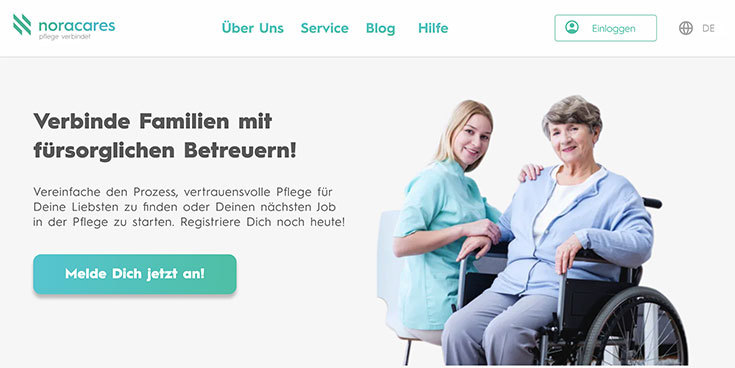Care level 1 in Germany
Care level 1 offers support for people with minor impairments to their independence - from 125 euros in relief to care advice. Find out how you can make the most of these benefits!
Care level 1 is the first level of care dependency in Germany and is aimed at people who score 12.5 to under 27 points in the care level classification. It offers support for those who can continue to actively participate in everyday life despite minor impairments to their independence. With benefits such as the 125 euros per month or care advice from the care insurance fund this level is particularly suitable for people who are largely independent but need a little help. In this article, you can find out everything you need to know about the requirements, benefits and the care application process to get the support that's right for you.
Care level 1 is like a soft net that catches people with minor impairments to their independence. It is aimed at those who are largely able to cope with everyday life on their own, but need support with minor hurdles such as housekeeping or organizing appointments.
With a classification of 12.5 to under 27 points in the assessment, the first care level opens the door to tailor-made benefits. These include the 125-euro relief amount, care advice and support services provided by a caregiver or care service. It is less about comprehensive care and more about strengthening independence and removing minor obstacles.
The care level 1 in Germany is therefore more than just a definition of long-term care insurance - it is a way to make everyday life easier and maintain quality of life despite minor limitations.
Prerequisites for classification in care level 1
The care level 1 is like a bridge that closes small gaps in independence. Certain conditions must be met in order to receive this support. Here is an overview of the most important requirements:
-
Slight restrictions: Things that used to be taken for granted, such as doing the shopping, running the household or organizing appointments, are now more difficult for you.
-
No extensive care required: Care level 1 is aimed at people who are largely independent and only require selective support.
-
Application to the long-term care insurance fund: The first step to support is the application, which initiates the review and paves the way to achievements.
-
Assessment by the Medical Service (MD): Experts check how well you can cope with everyday life - from moving around your own home and running a household to communicating with others.
- Score between 12.5 and 47.4: In the assessment process, every aspect of your abilities is converted into points. Care level 1 begins when 12.5 points are reached. If you achieve more than 27 points, the care level will be classified even higher.
With these requirements, care level 1 gives you the opportunity to hand over small everyday burdens without losing control of your life - a gentle support that makes life easier.
Criteria for the care assessment
The care assessment is like a detailed map that shows how much support someone needs in everyday life. It is carried out using the New Assessment Assessment (NBA), which determines the level of care based on six key areas. Each area is examined in detail to determine how much help is required.
-
Mobility: How safely do you move through your world? Can you walk, hold yourself or climb stairs independently, or do you need help to explore your surroundings? It's all about how well you can get around in everyday life.
-
Cognitive and communicative skills: Can you orient yourself in time and space? Do you know where you are, what the next step is and can you express your wishes and needs clearly in words? The ability to make decisions and recognize risks is also taken into account.
-
Behaviors and mental health issues: How much do mental health challenges affect your everyday life? Do you need help to deal with anxiety, aggressive behavior or other mental stress? It is also checked whether there are signs of delusions or if things are unintentionally damaged.
-
Self-care: How well can you look after yourself? Can you wash, groom and take care of your diet, or do you need support?
-
How to deal with illness- or therapy-related requirements: How do you deal with the challenges of an illness or treatment? Do you need support in carrying out therapies, such as dialysis or changing bandages? The assessors will determine how much help you need with these specific tasks.
- Organization of everyday life and social contacts: How independently do you organize your day? Can you plan your day independently, keep yourself busy and socialize regularly? How well you maintain social relationships is also assessed here.
Each of these six areas is based on a variety of criteria that are evaluated individually. The score for each module is added together and weighted to give the total score, which then determines the level of care. This paints an accurate picture of how much support you need in your daily life.
The care level 1 is like a well-equipped toolbox that offers you valuable tools and support to actively and independently shape your everyday life despite limitations. Even if no care allowance is paid in the traditional sense, there are various benefits available to you that will improve your quality of life and help you to master the challenges of everyday life.
-
Relief amount of 125 euros per month: This amount acts like a financial cushion that allows you to get targeted support where you need it most. You can use the 125 euros to take advantage of care services that make your everyday life easier - whether that's help around the house, accompaniment with shopping or regular walks with a care service. You can also use this amount for care services or respite care if your support Relatives need some time off or want support in difficult times.
-
Free care aids: Care insurance provides you with aids worth 40 euros every month. These aids are like little helpers in the background that support your independence and hygiene in the Home care improve. Disposable gloves, disinfectants, bed protection pads and other useful utensils help to make care at home safer and more comfortable. These aids are not only practical, but also make a valuable contribution to safe and hygienic care. You also receive up to €25.50 per month for a home emergency call and up to €50 for digital care applications (DiPA).
-
Care advice and courses: The long-term care insurance fund offers you extensive advice services that not only help you to apply for long-term care benefits, but also support you in the practical implementation in everyday life. Care advice is like a lighthouse that helps you find your way through the jungle of care services and options. You will receive information on your rights, benefits and also on special courses for people in need of care and their relatives. This advice is usually free of charge and is often offered both over the phone and in person - depending on your wishes. It is a valuable tool to make it easier for you to deal with care services.
-
Financial Support for home adaptations: If it is necessary to adapt your living space - be it by installing a grab rail or changing the bathroom - you can apply for grants of up to 4.500 euros per measure. These grants help people in need of care to make their home safer and more comfortable. With minor structural adaptations, you can maintain your independence even with care level 1 and design your environment so that it better supports your personal needs.
- Residential groups: If you are finding it difficult to cope at home, residential groups can provide valuable support. You will receive a grant of 214 euros per month for residential groups. These offers are like a flexible hand that supports you in your everyday life without you having to completely give up your independence. Here, specialists take care of your individual needs and you can continue to live in a home environment, supported by technical aids such as emergency call systems and special sleeping aids that make your everyday life safer and more comfortable.
With these services, you not only receive financial support, but also practical help that makes your everyday life easier and preserves your freedom. The support is like a network of helpers that helps you to live your everyday life actively and independently despite restrictions.
Applying for a Grade of care is like a carefully planned path that leads you step by step to the tools that will make your everyday life easier. With our step-by-step guide, this path becomes a walk in the park.
Step 1: Contacting the care insurance fund
The first step on your way to care level 1 begins with the care insurance fund. Call your health insurance company or visit their website. There you will receive the form you need to apply for the care degree. It's like the key that opens the door to the support options you need. Take your time to gather all the necessary information and ask the care insurance fund directly if anything is unclear so that you fill in all the details correctly. This is important so that the application process doesn't drag on forever.
Step 2: Fill out and submit care application
Now it's time to fill out the application. You need to provide information on the impairments to your independence, i.e. the areas in which you need support - for example, shopping, personal hygiene or housekeeping. You basically paint a picture of your everyday life and enter every task where you need help. Once you have completed the form, send it to the care insurance fund. You have now officially submitted your application for a care degree.
Step 3: Review by the MD
After submitting your application, the Medical Service (MD) will contact you and arrange an appointment for an assessment. An expert will come to your home to check where exactly you need support. This is an important phase in which your independence is assessed in various areas - from mobility to cognitive skills and dealing with everyday tasks. Be prepared to point out the areas where you need support. But don't be afraid of it and don't pretend! It's important to do everything exactly as you always do.
Step 4: Wait for notification from the care insurance fund
After the assessment has been completed, it's time to wait. The decision from the care insurance fund is like the result of a long process that now opens the doors to various care services. It usually takes about one to two weeks for the MD to prepare the detailed report, which he then sends to the long-term care insurance fund. The long-term care insurance fund then also needs time to evaluate the report and make a decision. This can take another one to four weeks. So expect an approximate processing time of two to six weeks in total.
Step 5: Claim recognition and benefits
If you are awarded care level 1, you are entitled to the corresponding benefits. The care insurance fund will inform you in writing about the classification and what is now available to you. This last step is the most exciting - because now you can claim the care services. This means that you will now receive the support you need to continue living independently.
Care level 1 offers valuable support that makes everyday life easier while maintaining independence. Here you can find out how to make the most of this support:
Relief in everyday life
With the relief amount of 125 euros per month and nursing aids such as disinfectants and disposable gloves can make your daily care routine much easier. These aids make everyday life more comfortable and easier.
Preserve self-determination
Thanks to care aids, you can remain independent as they help you to provide hygienic and practical care at home. This allows you to maintain your independence within your own four walls.
Relief for family caregivers
With preventive care, caregiving relativestake some time out while a caregiver takes over. This provides more relaxation and helps to maintain a balance between care and self-care.
Consultation and support
The care advice service helps you to find your way through the jungle of care services and make the best use of them. It ensures that you use all available resources correctly to manage your everyday life.
Financial security
The regular financial support provides so that you can easily finance the care and support you need without having to worry.
noracares is like your personal compass that helps you find your way through the world of care services. As a platform for care advice and the placement of care staff, noracares offers you tailor-made solutions that fit your needs exactly.
Find suitable nursing staff
Finding the right caregiver can seem like a long, rocky road. noracares takes this burden off your shoulders,`Caregiver placement, that are precisely tailored to your situation and requirements. Whether you need help in everyday life or want targeted support with specific tasks - noracares ensures that you find the perfect partner.
Care advice at eye level
The care advice from noracares is like a trustworthy companion who guides you through the care process with practical tips and specialist knowledge. Whether it's the application for care level 1, the classification of the need for care or the correct use of care services - noracares helps you to take all the right steps so that you receive the best possible support.
Individual and needs-based care
With noracares, you not only receive help with care placement, but also support in designing an individual care plan. The platform helps you to find the right care services to maintain or even improve your independence and quality of life in care level 1. This keeps the path to tailored care uncomplicated and transparent.
For many people, care level 1 in Germany can be a decisive step towards making it easier to cope with everyday life without losing their independence. The support provided by the relief amount, care aids and valuable advice are like little helpers that make life easier despite some restrictions. Thanks to these aids, you can remain active and don't have to compromise on your quality of life. Care level 1 ensures that you remain in control of your life - with support when you need it.
Register with noracares today and find the right assistance for your everyday life! Your independence is important to us - let's find out together how we can help you!







